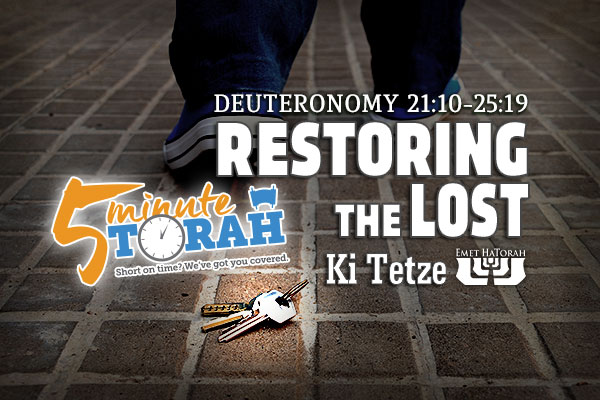Parashat Ki Tetze - Deuteronomy 21:10-25:19
Series:

Restoring The Lost
Parashat Ki Tetze contains a plethora of laws ranging from managing the spoils of war to sexual immorality to fulfilling vows and oaths. Our focus will be on the responsibility of guarding a lost object. At the beginning of chapter 22 we read:
You shall not see your brother's ox or his sheep going astray and ignore them. You shall take them back to your brother. And if he does not live near you and you do not know who he is, you shall bring it home to your house, and it shall stay with you until your brother seeks it. Then you shall restore it to him. And you shall do the same with his donkey or with his garment, or with any lost thing of your brother's, which he loses and you find; you may not ignore it. (Deuteronomy 22:1–3)
At first this seems like a simple, straight-forward commandment of the Torah: If you find something that doesn’t belong to you, whether it is a living animal or an inanimate object, either find the owner and give it back or hold onto it until the owner comes looking for it. However, because this passage is brief without any details of how do deal with various possible scenarios, there are many implications, applications, and questions that are left unaddressed.
This set of commandments revolving around the care and return of a lost object is one of the foundational passages that many begin studying when commencing to learn Mishnah and Talmud. Tractate Bava Metzia has a whole section exploring the various facets of these principles and their subsequent applications. Such questions are raised as, “How long must one hold on to the lost object?” or “How does a person deal with the extra expense of keeping a lost animal?” or “What if the lost animal dies while in one’s possession?” or “What should a person do with items that cannot be identified by their owner, such as scattered coins?” These are all legitimate questions that need resolution if we desire to fulfill this commandment.
There is, however, another way we can apply this passage. Midrashically, we can also understand these laws to apply to anything that is lost, not just tangible objects. The principle of this passage can equally apply to things that are spiritual in nature. An example of this would be the Sabbath. If a God-fearing person does not recognize the Sabbath, yet is continually growing spiritually, then there is a good chance that he will eventually realize that something has been lost along the way. He is missing out on the blessing of the Sabbath, but has not realized it yet. We must hold on to this missing blessing for him “until your brother seeks it.”
We must be particularly sensitive to followers of Yeshua who are growing and spiritually searching. Maybe they don’t recognize this particular object of theirs that we are safeguarding, but we must work to help them see their loss, as it says, “You shall take them back to your brother.” We must do so, however, in a way that is loving and respectful, and with a great deal of patience and humility. Just as we would never maliciously hunt down the owner of a lost puppy and condemn them for their negligence, we don’t need to do so with lost religious practices either.
If we find a power tool, but leave it out in the rain until we return it to its owner several months later, it will not be much of a mitzvah to return the rusted and unusable item to its owner. But if we have taken good care of it while it is in our care—keeping it dry and protected, maybe even cleaning it up a bit—then when we return it to its proper owner, not only will the object be received with joy, but the owner will be grateful for our efforts to take care of the lost item. The same is true when it comes to returning lost spiritual items. We should bring the lost item back to the person in a way that it will be seen as unsoiled, beautiful, and familiar. If we can’t return it in this manner, then why would they want it back at all?








